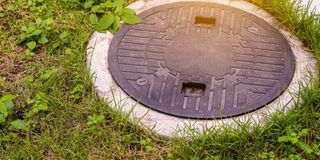Prime
Keep your septic tank in tip-top shape

To preserve the soil that surrounds the septic tank, ensure the area is always covered with lawn grass. PHOTO/NET
What you need to know:
If you understand the workings of your septic system very well, you can recognise clues when something is going wrong.
The septic tank accommodates the waste water that flows from toilets, laundry and sinks in a home. Usually made of solid cast concrete, the tank has an inlet and an outlet for waste. Once the waste enters the tank, the solids settle to the bottom to decompose and become the sludge layer. If the sludge is not pumped out on a regular basis, the drains get clogged, causing failure.
Hassan Musisi, a plumber, says there are several ways you can maintain your septic tank. “Normally, the septic tank is automatically attached to the tank which helps to provide water that supports the system for treatment and liquid waste before it moves to the drainage,” he explains.
Understand the system
Musisi says one sure way to keep your septic tank in proper working condition is understanding its flowing system, the type and how it was fixed with all the joints and corners. If you understand the workings of your septic system very well, you can recognise clues when something is going wrong.
“Getting these clues in time helps nip the problem in the bud thus preventing bigger problems that might be more costly in the long run,” he says.
Do not strain it
As already stated, the septic tank takes care of all water used in the household, which is a lot. This means it is already working at capacity and any extra strain will cause damage. One of the most effective ways to protect your septic system from wear and tear is to control the amount of water that enters the tank in the first place. For instance, when you wash dishes by hand, do not keep the water running the whole time. When you wash your hands, lather them first and only turn on the water when you are ready to rinse them off.
“Why should a shower take an hour? If you really feel dirty do not let the shower last more than 30 minutes,” Musisi advises.
Do not use your toilet as a trash
The toilet is not meant to be used to dispense food items, especially the items that could clog it. Never flush down hair, coffee grounds, cat litter, paper towels, grease or oil, pasta, flour, tampons, diapers, condoms, or cigarette butts. A toilet should not even be used to flush away paper towels, which are better dispensed within the trash. In only a short amount of time, these items could clog up your septic tank, if they don’t clog your toilet first.
Do regular maintenance
A septic tank needs periodic maintenance to remain working and healthy throughout the average span of a residential occupancy. Solid waste, in particular, needs to be pumped from the septic tank at periodic intervals. Musisi urges homeowners to get a professional to do this maintenance. To keep your septic system healthy and free of damage, it is important to protect the area around the system, especially the ground above. To preserve the soil that surrounds the septic tank, ensure the area is always covered with lawn grass. Do not use that ground above the septic tank as the location for a playground structure, hot tub, gazebo, deck or parking space. Never drive vehicles over the septic area or cover the overlying soil with asphalt or gravel.
Use safe products
When it comes to soaps, towels and other hygiene products, only use brands that are safe for septic systems. Musisi recommends soaps made from natural products that are friendlier to the environment than chemical–based soaps. These will be easier on the septic system. Also use pre–moistened tissue paper and soft brands of toilet paper, as these will be easier for the septic system to handle. Just as paper towels can clog up a toilet, regular brands of tissue paper can be hard on a septic tank when they enter in large quantities.




